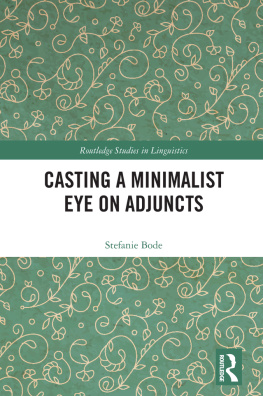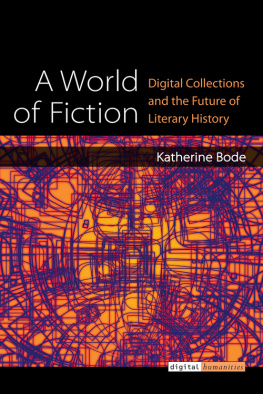Stefanie Bode - Casting a Minimalist Eye on Adjuncts
Here you can read online Stefanie Bode - Casting a Minimalist Eye on Adjuncts full text of the book (entire story) in english for free. Download pdf and epub, get meaning, cover and reviews about this ebook. City: Milton, year: 2019, publisher: Routledge, genre: Home and family. Description of the work, (preface) as well as reviews are available. Best literature library LitArk.com created for fans of good reading and offers a wide selection of genres:
Romance novel
Science fiction
Adventure
Detective
Science
History
Home and family
Prose
Art
Politics
Computer
Non-fiction
Religion
Business
Children
Humor
Choose a favorite category and find really read worthwhile books. Enjoy immersion in the world of imagination, feel the emotions of the characters or learn something new for yourself, make an fascinating discovery.
- Book:Casting a Minimalist Eye on Adjuncts
- Author:
- Publisher:Routledge
- Genre:
- Year:2019
- City:Milton
- Rating:3 / 5
- Favourites:Add to favourites
- Your mark:
- 60
- 1
- 2
- 3
- 4
- 5
Casting a Minimalist Eye on Adjuncts: summary, description and annotation
We offer to read an annotation, description, summary or preface (depends on what the author of the book "Casting a Minimalist Eye on Adjuncts" wrote himself). If you haven't found the necessary information about the book — write in the comments, we will try to find it.
Casting a Minimalist Eye on Adjuncts — read online for free the complete book (whole text) full work
Below is the text of the book, divided by pages. System saving the place of the last page read, allows you to conveniently read the book "Casting a Minimalist Eye on Adjuncts" online for free, without having to search again every time where you left off. Put a bookmark, and you can go to the page where you finished reading at any time.
Font size:
Interval:
Bookmark:

This book offers a comprehensive account of adjuncts in generative grammar, seeking to reconcile the differing ways in which they have been treated in the past by proposing a method of analysis grounded in simplification based on Simplest Merge.
The volume provides an up-to-date review of the existing literature on adjuncts and outlines their characteristic properties and the subsequent difficulties in adequately defining and treating them. The book compares previous attempts to account for adjuncts which have tended to use additional mechanisms or syntactic operations as a jumping-off point from which to propose a new way forward for analyzing them grounded in minimalist theory. Adopting an approach in the spirit of the strong minimalist thesis (SMT), Bode suggests an analysis of adjuncts that applies a minimalist approach based on theoretical simplicity, one which does not resort to extra mechanisms in capturing the empirical properties of adjuncts.
Offering a comprehensive overview of research on adjuncts and foundational minimalist principles, this book will be of particular interest to graduate students and practicing researchers interested in syntax.
Stefanie Bode is Adjunct Lecturer at the Georg-August University of Gttingen, Department of English PhilologyLinguistics, Germany. Her doctoral thesis, on the verb be in the English sentence structure, was published in 2003.
Time Series Analysis of Discourse
Method and Case Studies
Dennis Tay
Heart- and Soul-Like Constructs across Languages, Cultures, and Epochs
Edited by Bert Peeters
Systemic Functional Political Discourse Analysis
A Text-based Study
Eden Sum-hung Li, Percy Luen-tim Lui and Andy Ka-chun Fung
Systemic Functional Language Description: Making Meaning Matter
Edited by J.R. Martin and Y.J. Doran
Rarely Used Structures and Lesser-Studied Languages
Insights from the Margins
Emily Manetta
Externalization
Phonological Interpretations of Syntactic Objects
Yoshihito Dobashi
Approaches to the Study of Sound Structure and Speech
Interdisciplinary Work in Honour of Katarzyna Dziubalska-Koaczyk
Agnieszka Kiekiewicz-Janowiak, Magdalena Wrembel and Piotr Gsiorowski
Casting a Minimalist Eye on Adjuncts
Stefanie Bode
For more information about this series, please visit: www.routledge.com/Routledge-Studies-in-Linguistics/book-series/SE0719
Stefanie Bode

First published 2020
by Routledge
52 Vanderbilt Avenue, New York, NY 10017
and by Routledge
2 Park Square, Milton Park, Abingdon, Oxon, OX14 4RN
Routledge is an imprint of the Taylor & Francis Group, an informa business
2020 Taylor & Francis
The right of Stefanie Bode to be identified as author of this work has been asserted by her in accordance with sections 77 and 78 of the Copyright, Designs and Patents Act 1988.
All rights reserved. No part of this book may be reprinted or reproduced or utilised in any form or by any electronic, mechanical, or other means, now known or hereafter invented, including photocopying and recording, or in any information storage or retrieval system, without permission in writing from the publishers.
Trademark notice : Product or corporate names may be trademarks or registered trademarks, and are used only for identification and explanation without intent to infringe.
Library of Congress Cataloging-in-Publication Data
Names: Bode, Stefanie, author.
Title: Casting a minimalist eye on adjuncts / Stefanie Bode.
Description: 1. | New York: Taylor and Francis, 2020. | Series:
Routledge studies in linguistics | Includes bibliographical
references and index.
Identifiers: LCCN 2019043417 | ISBN 9780367421939
(hardback) | ISBN 9780367822613 (ebook)
Subjects: LCSH: Grammar, Comparative and generalAdjuncts. |
Grammar, Comparative and generalSyntax.
Classification: LCC P299.A32 B63 2020 | DDC 415/.7dc23
LC record available at https://lccn.loc.gov/2019043417
ISBN: 978-0-367-42193-9 (hbk)
ISBN: 978-0-367-82261-3 (ebk)
Typeset in Sabon
by Apex CoVantage, LLC
For Daniel
I thank the following copyright holders and the authors for granting permission to reprint quotes used for argumentation: Cambridge University Press, Columbia University Press, De Gruyter, Elsevier, John Benamins, Oxford University Press, Peter Lang GmbH, Routledge, John Bowers, and Balazs Surnyi. I am also grateful for the helpful open access policy of many publishers and MITs general copyright strategy concerning reprinting smaller quotes. I am basically indebted to every author referred to, and especially to those whose works I discuss in the book. They share the deep interest in the Minimalist Program and contributed to this book. A project like this would not be possible without them. Thanks also to my publisher, Routledge, for giving me the opportunity to present my ideas on adjuncts. On a personal note, I want to thank Elysse Preposi (Editor, Linguistics), Helena Parkinson (Editorial Assistant), Eleni Steck (Production Editor), and Ramachandran Vijayaraghavan (Project Manager) for their help. I also thank two reviewers for their helpful suggestions. I thank my family for supporting me and being there for me. Eventually, I want to express my deepest gratitude to Daniel Seely, for his invaluable comments and encouragement.
Why study adjuncts today? Recent minimalist discussion elaborates on the architecture of the grammar and raises such questions as: what is part of narrow syntax or what belongs to the interfaces SEM and PHON? There is a lot of discussion in the generative approach to syntax and, broadly speaking, minimalism splits into two opposing views. Either syntax is taken to be deterministic, leading to a crash-proof situation at the interfaces, or syntax is basically free, and its output is subject to interpretation at the interfaces. The most recent debates build upon the latter view, since applying Merge freely simplifies UG in a crucial way. Adjuncts have been under debate in the previous framework of Government & Binding and, strikingly, the issue has not been settled under minimalist approaches either.
Every textbook on syntax addresses adjuncts. Adjuncts actually are such a basic phenomenon of language that they need to be part of any introduction; nevertheless, we do not find a consensus among scholars, even at the textbook level. The way in which beginners of linguistics are confronted with adjuncts is particularly telling because the degree of consensus among linguists can often be judged by considering introductions into a subject. Textbooks discuss more or less the same properties of adjuncts relating to selection, theta roles, order, optionality, islandhood, and more, but the structural proposals look rather different. For instance, Koeneman and Zeijlstra (2017) use a V-recursion so that, in terms of X-bar theory, adjuncts are placed in a X-sister position, making it hard to distinguish them from specifiers and, more concretely, from subjects. Adger (2003) repeats the maximal level and thus resorts to segments of XP (again using X-bar terminology). He leaves room for a subject agent to be projected in the specifier of V, and the most crucial aspect of his analysis is that he assumes an extra syntactic operation Adjoin that introduces adjuncts into the derivation (as opposed to other constituents which enter the derivation via Merge ). Both textbooks use a recursion at a specific X-bar theoretic level, which is actually impossible to formulate in a purely minimalist framework. We will come back to this point later. Similarly, Radford (2006) uses the X-level, with the additional complication that, in his proposal, adjuncts and arguments basically occur in the same positions. The distinction between arguments and adjuncts gets blurred and, if it is reflected in the tree diagrams at all, only works in terms of X-bar-theoretic principles formulated in the previous Government & Binding framework. Thus, it is crucial that we observe that a frequent linguistic phenomenon as adjuncts does not receive a uniform treatment even at textbook level. Hence, it is not surprising that scientific research has not come to a general solution or consensus concerning adjuncts either. The need for a theoretical implementation of adjuncts is obvious. In the beginning of his discussion of adjuncts, Adger stresses that the mechanisms by which adjuncts are implemented into phrase structure still pose major research questions (Adger 2003: 111). After decades of research into the matter, this is a surprising fact. It should invite scholars to put adjuncts on their agenda again, because the theoretical and the empirical nature of the subject needs to be addressed in concert.
Font size:
Interval:
Bookmark:
Similar books «Casting a Minimalist Eye on Adjuncts»
Look at similar books to Casting a Minimalist Eye on Adjuncts. We have selected literature similar in name and meaning in the hope of providing readers with more options to find new, interesting, not yet read works.
Discussion, reviews of the book Casting a Minimalist Eye on Adjuncts and just readers' own opinions. Leave your comments, write what you think about the work, its meaning or the main characters. Specify what exactly you liked and what you didn't like, and why you think so.











